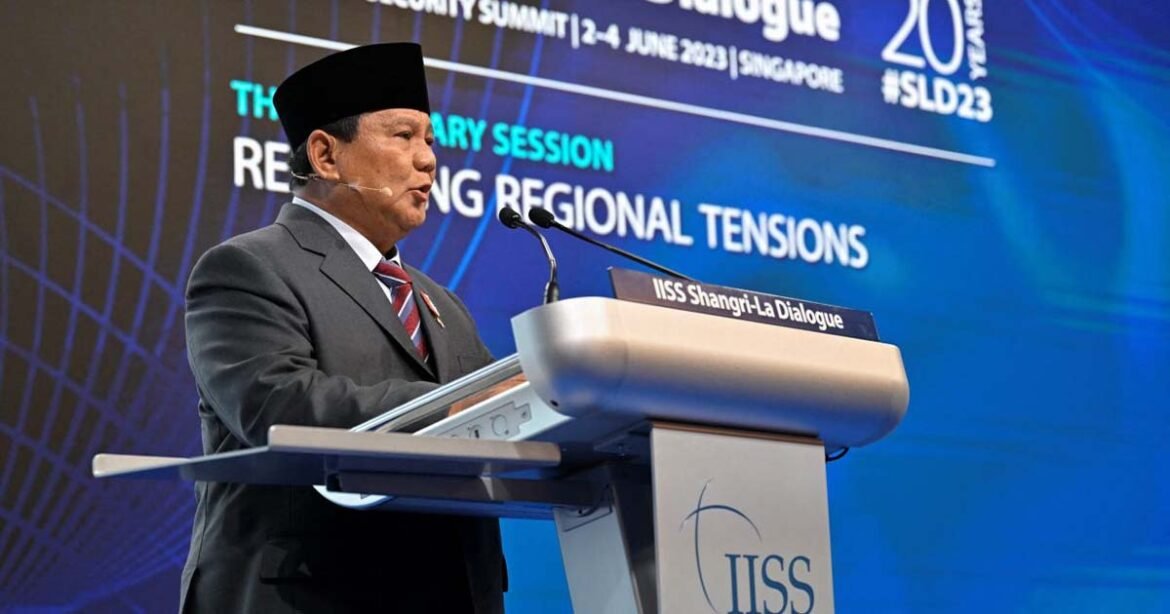Indonesia’s Defence Minister, Prabowo Subianto, made a significant impact at the Shangri-La Dialogue defence meeting in Singapore by introducing a new peace initiative to address the ongoing conflict in Ukraine. The proposal aims to bring an end to hostilities and promote peace in the region. Prabowo presented a comprehensive plan that includes implementing a ceasefire and establishing a demilitarized zone. According to the plan, both Russia and Ukraine would withdraw approximately 15 kilometres (nearly 10 miles) from their respective forward positions.
Seeking a just peace for Ukraine, not surrender
Prabowo emphasized the importance of having a United Nations peacekeeping force monitor the demilitarized zone. He also proposed conducting an UN-sponsored referendum in the disputed territory to determine the preferences of the majority of the inhabitants. However, he did not specify the exact regions involved. During the panel discussion, Josep Borrell, the High Representative and Vice President of the European Commission, recognized that ending military support for Ukraine would lead to a prompt resolution of the conflict. However, he expressed concerns about the potential compromise of Ukraine’s sovereignty under external influences. Borrell characterized Indonesia’s peace proposal as a genuine effort to bring about peace in Ukraine, highlighting the significance of a fair and equitable peace rather than one that requires surrender.
This peace initiative from Indonesia follows President Joko Widodo’s visit to Moscow and Kiev last year, where he offered to mediate peace talks between the leaders of Russia and Ukraine. President Widodo, who assumed the chairmanship of the G20 group of major economies at that time, openly demonstrated his readiness to serve as a mediator in the pursuit of peace.
Ceasefire and referendum to bring peace
Prabowo’s multi-point plan includes a ceasefire and the establishment of a demilitarized zone, with both Russia and Ukraine withdrawing approximately 15 kilometres (nearly 10 miles) from their respective forward positions. He suggested conducting an UN-sponsored referendum in the disputed territory to objectively determine the preferences of the majority of the inhabitants, without specifying the specific regions involved.
It is worth noting that while Indonesia voted in favour of a United Nations resolution denouncing Russia’s offensive in Ukraine, it has refrained from imposing economic sanctions on Moscow. In February of this year, China also presented a 12-point peace plan for Ukraine, emphasizing dialogue, respect for territorial sovereignty, and the cessation of economic sanctions. However, China’s plan did not propose or suggest the withdrawal of Russian forces from the region. Now, Indonesia’s defence minister, Prabowo Subianto, puts forward a comprehensive plan to resolve the conflict between Russia and Ukraine at a defence summit in Singapore. However, the initiative received swift criticism from attendees at the summit. Subianto called on Russia and Ukraine to immediately cease hostilities, noting the severe impact of the conflict on Asian economies and food supplies.
Seeking lasting peace
In his speech at the Shangri-La Dialogue defence summit, Subianto suggested a ceasefire “at present positions” and the establishment of demilitarised zones, which would be observed and guaranteed by United Nations peacekeeping forces. He also proposed a future referendum in the disputed areas, organized by the UN. Subianto declares Indonesia’s preparedness to contribute troops to a future United Nations peacekeeping mission. China has also presented its own peace plan for the war in Ukraine, but it has faced scepticism from European Union politicians due to its vagueness. While China claims neutrality in the conflict, it has been criticized for not condemning Russia’s invasion. In contrast, the United States and Western allies have provided significant military and financial support to Ukraine since the Russian invasion.
Indonesia, following its non-aligned diplomatic approach, had previously attempted to mediate peace. President Joko Widodo travelled to Kyiv and Moscow, meeting with the leaders of both nations last year while Indonesia chaired the G20 group of major economies. However, defence minister Subianto’s proposal received criticism during the summit. EU foreign policy chief Josep Borrell emphasized the need for a just peace in Ukraine, rather than a peace based on surrender. Subianto responded by highlighting Indonesia’s perspective and history of sovereignty violations, stating that he was presenting a conflict resolution plan without taking sides on who was right or wrong. While Indonesia voted in favour of a UN resolution condemning Russia’s invasion of Ukraine, it has not imposed economic sanctions against Moscow.
In conclusion, Prabowo Subianto has taken a prominent role by proposing a comprehensive plan to resolve the conflict between Russia and Ukraine at the defence summit in Singapore. While the initiative faced criticism from some attendees, it signifies Indonesia’s commitment to seeking lasting peace in the region. By advocating for a ceasefire, demilitarized zones, and an UN-sponsored referendum, Indonesia aims to contribute to a just and equitable resolution of the conflict, without taking sides on who is right or wrong.


